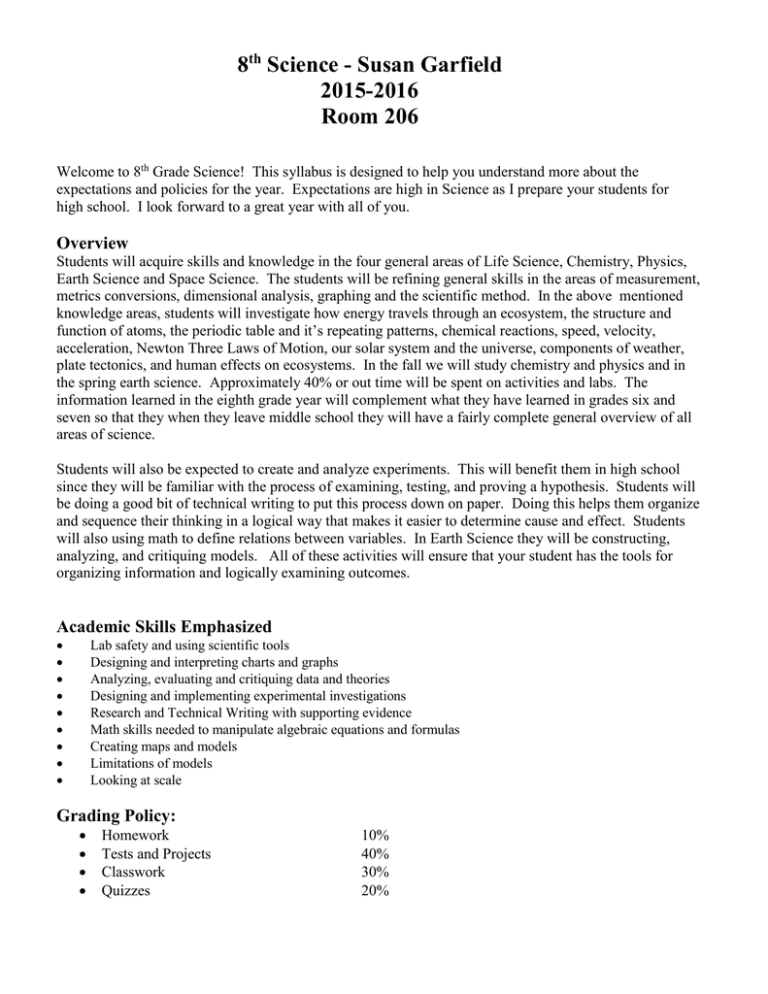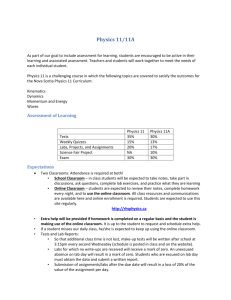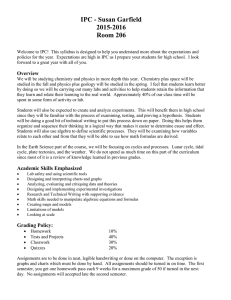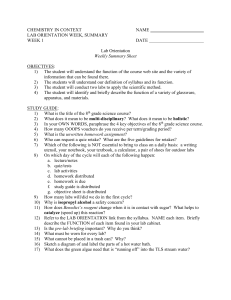Science 8 Syllabus
advertisement

8th Science - Susan Garfield 2015-2016 Room 206 Welcome to 8th Grade Science! This syllabus is designed to help you understand more about the expectations and policies for the year. Expectations are high in Science as I prepare your students for high school. I look forward to a great year with all of you. Overview Students will acquire skills and knowledge in the four general areas of Life Science, Chemistry, Physics, Earth Science and Space Science. The students will be refining general skills in the areas of measurement, metrics conversions, dimensional analysis, graphing and the scientific method. In the above mentioned knowledge areas, students will investigate how energy travels through an ecosystem, the structure and function of atoms, the periodic table and it’s repeating patterns, chemical reactions, speed, velocity, acceleration, Newton Three Laws of Motion, our solar system and the universe, components of weather, plate tectonics, and human effects on ecosystems. In the fall we will study chemistry and physics and in the spring earth science. Approximately 40% or out time will be spent on activities and labs. The information learned in the eighth grade year will complement what they have learned in grades six and seven so that they when they leave middle school they will have a fairly complete general overview of all areas of science. Students will also be expected to create and analyze experiments. This will benefit them in high school since they will be familiar with the process of examining, testing, and proving a hypothesis. Students will be doing a good bit of technical writing to put this process down on paper. Doing this helps them organize and sequence their thinking in a logical way that makes it easier to determine cause and effect. Students will also using math to define relations between variables. In Earth Science they will be constructing, analyzing, and critiquing models. All of these activities will ensure that your student has the tools for organizing information and logically examining outcomes. Academic Skills Emphasized Lab safety and using scientific tools Designing and interpreting charts and graphs Analyzing, evaluating and critiquing data and theories Designing and implementing experimental investigations Research and Technical Writing with supporting evidence Math skills needed to manipulate algebraic equations and formulas Creating maps and models Limitations of models Looking at scale Grading Policy: Homework Tests and Projects Classwork Quizzes 10% 40% 30% 20% Assignments are to be done in neat, legible handwriting or done on the computer. The exception is graphs and charts which must be done by hand. All assignments should be turned in on time. The first semester, you get one homework pass each 9 weeks for a maximum grade of 50 if turned in the next day. No assignments will accepted late the second semester. Retesting: Retesting will be done only for tests. All students who make below a 70 on the original test may take the retest. TEXTBOOKS: 1. We have a new book this year –Science 8 by McGraw Hill. This is not a hardback book but an interactive notebook, softcover. All of the materials are on the HUB and your student will be receiving passwords and userids to access this material. Userid: Password: Website: 2. We will also be using Integrated Physics and Chemistry by Cambridge Physics from time to time. This can be found on my schoolwires page. Required Materials: One green binder for papers Paper, pens, pencils, metric ruler Red checking pens Good Eraser Graph Paper Notebook Paper Scientific Calculator Tabs for science binder Student Expectations and Responsibilities: Individual responsibility is stressed in the IPC as most assignments are individual and not group based. That means that the first moment you do not understand something we are covering in class, you must stop and ask questions. Your best friend and tablemates are not responsible for what you know - you are. Ask Questions! I also ask that students please bring a ruler and calculator to class every day. You never know when we are going to need them and there is not enough time for students to go back to their locker. CLASS NORMS/PROTOCOLS: 1. 2. 3. 4. 5. 6. 7. 8. 9. 10. Labs: Labs are a very important part of the learning process in science and I feel that they are just as important as tests, and sometimes more so, in assessing student knowledge and skills. For this reason labs are a very important part of your grade – they can count as classwork, 30%. If you do your best on the labs, and I’m sure you will, your grade should be stellar. However, the labs are quite rigorous and some of the questions on tests come from the labs covering that topic. If you pay attention, follow directions, and use your time well, you should be fine. Labs are not a time to play and chitchat with your friends. Horseplay will not be tolerated in labs. As you can understand, this could be quite dangerous from a safety standpoint. PARENTS: Please feel free to share any comments, questions or concerns that you might have. I try to answer all emails and phone calls within 48 hours so if you have not heard back from me please email me again. The email might have gotten lost amid all the other emails. My conference time is 3rd Period on Tuesdays and Thursdays, between 11:30-12:00am. Also, if you have an area of expertise or interest that you would like to share with the students, please let me know. My email address is sgarfiel@houstonisd.org. The school phone number is 713-917-3565. ______________________________ Parent Name __________________________ Parent Signature _____________ Date ______________________________ Parent’s Daytime Phone Number ____________________________________________ Parent’s E-mail Address STUDENTS: I have carefully read and understand the information, procedures, and guidelines for Mrs. Garfield’s 8th Science class. ______________________________ Student Name __________________________ Student Signature _____________ Date



